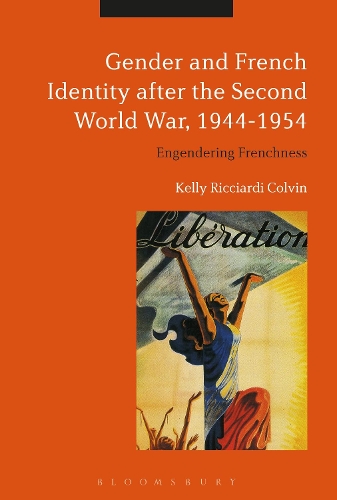
Gender and French Identity after the Second World War, 1944-1954: Engendering Frenchness
(Paperback)
Available Formats
Publishing Details
Gender and French Identity after the Second World War, 1944-1954: Engendering Frenchness
Bloomsbury Publishing PLC
Bloomsbury Academic
21st March 2019
United Kingdom
Classifications
Tertiary Education
Non Fiction
History and Archaeology
Gender studies: women and girls
305.4209440945
Physical Properties
Paperback
256
Width 156mm, Height 234mm
363g
Description
The enfranchisement of women in Charles de Gaulles France in 1944 is considered a potent element in the nations self-crafted, triumphant World War Two narrative: the French, conquered by the Germans, valiantly resisted until they rescued themselves and built a new democracy, honoring Frances longstanding liberal traditions. Kelly Ricciardi Colvins Gender and French Identity after the Second World War, 1944-1954 calls that potent element into question. By analyzing a range of sources, including womens magazines, trials, memoirs, and spy novels, this book explores the ways in which culture was used to limit the power of the female vote. It exposes a wide network of constructed behavioral norms that supported a conservative vision of French identity. Taken together, they depicted men as virile Resistors for French democracy and history, and women as solely domestic support. Indeed Colvin shows that womens access to the vote emerged alongside an explosion of cultural messages that encouraged them to retreat into the home, to find mates, to have millions of beautiful babies, in the words of de Gaulle, and not to challenge patriarchy in any way. This is a vital study for understanding the nature of postwar France and womens history in 20th-century Europe.
Reviews
This book offers thought-provoking and compelling examples and should inspire further paths of research and methods into thinking about how culture stems from and reinforces patriarchal systems. * Journal of Modern History *
Colvin (Brown) shows that there remained a sizeable gap between enfranchisements seeming promise of full citizenship and the social-political realities that continued to limit possible avenues for women and to prioritize their confinement in various ways in order to maintain a patriarchal vision of an idealized gender order. Summing Up: Recommended. Upper-division undergraduates and above. * CHOICE *
Colvin draws from a wide array of narratives to demonstrate how the postwar natalist stance and the need to reestablish normalcy and stability fuelled cultural narratives that undercut womens relationship to power, at precisely the moment in which French women embarked on new political participation. Her work offers a valuable contribution to a more nuanced understanding of gender identity in postwar France. * French Review *
Utilising a varied body of source material including womens magazines, Resistance press, trials, memoirs, and post-war media, [Colvin] highlights the gap between the promise of enfranchisement and social attitudes towards womens roles in newly-liberated France ... Represents an ambi-tious contribution to scholarship on the shifting social positioning of French women in the period immediately trailing the Liberation. * Journal of Contemporary History *
Author Bio
Kelly Ricciardi Colvin is Visiting Assistant Professor at Brown University, USA.
